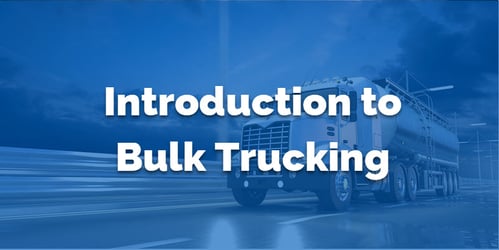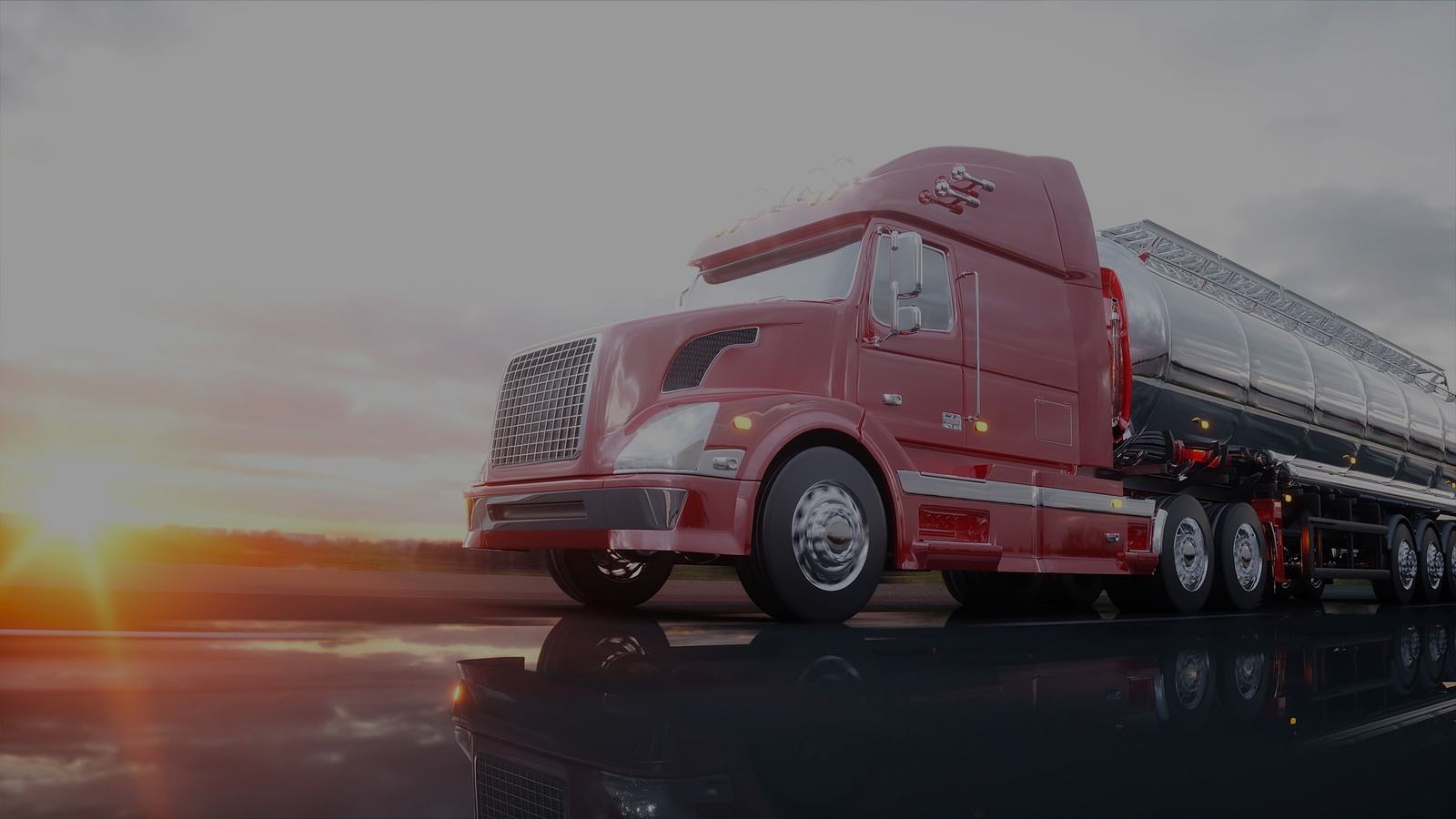Many of the products you’re currently surrounded by began their existence in bulk liquid, powder, or pellet form. As such, they were transported on bulk tankers or trailers. This article serves as a primer on bulk trucking: the equipment, processes and responsibilities involved, as well as tips on choosing the right transportation partners to help.
What is bulk trucking?
 Bulk trucking is the process of transporting liquid or dry bulk materials in either a liquid tanker, a dry bulk trailer, or within drums or totes in a dry van.
Bulk trucking is the process of transporting liquid or dry bulk materials in either a liquid tanker, a dry bulk trailer, or within drums or totes in a dry van.
Liquid bulk tankers are made of stainless steel or aluminum and can be insulated or non-insulated. The typical tanker holds 6,000-7,000 gallons, while some carriers offer “tight fill” tanks that hold only up to 5,000 gallons. The tanker may consist of a single compartment or be divided into two-to-four compartments for hauling different commodities at once. There are also special food-grade tanker trailers for products such as fruit juice, vegetable oil and food ingredients.
A dry bulk trailer is basically a metal cylinder, but with a series of cone-shaped hoppers at the bottom. The trailer comes with a series of openings called manholes, which are used to load the product. There are generally three to six manholes distributed along the top of and back of the trailer. Dry bulk trailers come in different sizes. One manufacturer, Polar, sells models that range in capacity from 550 cubic feet with a single hopper to 2,800 cubic feet with six hoppers.
Bulk products, whether raw goods or finished products, can also be loaded into specialized containers and shipped in a regular dry van trailer. The types of containers commonly used for chemical transport include drums and intermediate bulk containers (IBC). These IBC totes can handle large quantities of liquids or granulate materials, and range in carrying capacity from 180 to 550 gallons. They are available in plastic or stainless steel and can be stacked.
Bulk trucking cost
The cost of shipping liquid or bulk freight is going to be higher than regular dry van shipments for a number of reasons.
- The equipment is more expensive. A regular dry van trailer will cost a carrier up to $40,000 to purchase whereas a liquid bulk tank will cost up to $125,000, plus the cost of special equipment.
- Deadhead miles are commonly baked into a carrier’s rate as each delivery requires the truck to visit a tank wash for cleaning prior to its next load. The closest available truck devoted to the product you’re shipping might be hundreds of miles away, increasing the number of miles you’ll pay for.
- Hazardous loads (common in bulk chemical transportation) are likely going to be more expensive than non-hazardous because of the higher insurance requirements and increased driver training associated with hazmat.
- You’ll pay the same rate whether you fill the tank or trailer halfway or all the way to the top. The carrier can’t combine your cement with someone else’s magnesium oxide to create a “full tank load” shipment.
Key bulk trucking considerations
There are many factors that you and your bulk trucking provider will need to consider before hauling – and quoting – your freight.
- What is the product? You’ll need to give your transportation provider your product’s Safety Data Sheet (SDS) and other key information that will dictate equipment needs.
- Where are you shipping from/to?
- Is there additional/specialized equipment information? (e.g., how many 20-foot hose lengths are required? Width of hose required? Are there fittings and adapters needed for loading and unloading?)
- What are the product’s special properties? (e.g., Hazardous? Temperature sensitive?)
- How many gallons (liquid) or how much weight (dry) are you moving? This will determine the number of trucks needed to haul your load.
- Does the receiver’s facility require any specific safety equipment?
- Are there any incompatible prior products (items that cannot have been shipped in the tanker or trailer before yours)?
- Is there a scale available at the loading site?
- From what will you load the product? Silo? Tank? Railcar? etc. And into what kind of receptacle will you unload it?
- How close can you get the truck to the product for loading and unloading?
For more information on equipment, loading and unloading processes, and other items, check out our detailed articles on liquid bulk shipping and dry bulk shipping.
Who’s responsible for what?
|
Shipper Responsibilities |
Receiver Responsibilities |
Carrier Responsibilities |
|
|
|
Tank washing
One of the biggest differences between dry bulk and dry van freight is the need to wash the tanker or trailer. After dropping a load, the driver might have to travel an hour or more—maybe even to another state—to find a certified tank wash station.
This requirement adds extra time to every shipment. It also adds cost, partly because every shipment includes deadhead miles, and partly because the shipper pays for the wash. Because tank washes are few and far between, with little competition, they can generally charge what they want for their services.
Choosing a Carrier or Freight Broker
An unqualified carrier or freight broker always exposes you to risk, and that risk is significantly greater when you’re dealing with bulk freight. Don’t invite trouble. Often, all you need is a short conversation with a transportation provider, asking the right kinds of probing questions, to figure out who’s a real expert and who’s just pretending.
When evaluating bulk trucking companies to haul your loads, consider the following:
- Experience: Look for many years of safe, compliant shipments.
- Coverage: Make sure they provide service on a regular basis in the parts of the country where you need to pick up and deliver your product.
- Authority: Make sure they are licensed to operate in the states where you need service.
- References: Ask if you can talk to some of their customers. Then actually get on the phone with those people. Find out how the carrier’s process works and what their quality of service is.
- Safety: Find data through commercial and government sources to learn about the carrier’s safety record.
- Insurance: Get proof that the company has the right level of liability and cargo insurance for your load.
Whether you’re new to bulk shipping or a seasoned pro, there are 3PL freight brokers that specialize in bulk freight and can be invaluable assets to your bulk trucking operations. Bulk Connection is one such specialist, with one of the largest networks of bulk carriers in North America. To learn more about the benefits of working with a true bulk freight specialist, contact Bulk Connection today.




